Main CPGW Record
Surname: FAULKNER
Forename(s): Job
Place of Birth: Runcorn, Cheshire
Service No: 12147
Rank: Private
Regiment / Corps / Service: Duke of Wellington’s (West Riding Regiment)
Battalion / Unit: 9th (Service) Battalion
Division: 17th (Northern) Division
Age: 21
Date of Death: 1915-09-08
Awards: ---
CWGC Grave / Memorial Reference: II. B. 9.
CWGC Cemetery: RIDGE WOOD MILITARY CEMETERY
CWGC Memorial: ---
Non-CWGC Burial: ---
Local War Memorial: SILSDEN, YORKSHIRE
Additional Information:
Job Faulkner was the son of Richard and Mary Ann Faulkner, née Merrick and brother of Private Daniel Faulkner (40050) (q.v.) and Private Edward Faulkner (29/174) (q.v.). Their father was born at London and mother at West Bromwich, Staffordshire.
1901 Silsden, Yorkshire Census: 3, Hayhills Road - Job Faulkner, aged 7 years, born Runcorn, Cheshire, son of Mary Ann Faulkner, widow.
1911 Silsden, Yorkshire Census: 8, St John's Square - Job Faulkner, aged 18 years, born Runcorn, Yorkshire [sic]. [Job was boarding with Norman and Sarah Hannah Smith.]
British Army WW1 Medal Rolls Index Cards: Pte Job Faulkner, 12147, W. Rid. R. Theatre of War first served in: (1) France. Date of entry therein: 15.7.15. Died 8.9.15. Correspondence: Sister Mrs. H. South, 9, Staveley Road, off Ingrow Lane, Ingrow, Nr. Keighley, Yorks.
British Army WW1 Medal and Award Rolls: Pte Job Faulkner, 12147, 9th W. Rid. R. K. in A. 8.9.15.
Army Registers of Soldiers' Effects: Pte Job Faulkner, 12147, 9/W. Riding Regt. Date and Place of Death: 8.9.15. In action. To whom Authorised/Amount Authorised: Brother - Willie. £0 12s. 4d. Brother - Hugh. £0 12s. 4d., address unknown. Sister - Hannah. £1 15s. 8d. Sister - Elizabeth. £1 4s. 8d. and £2 5s. 1d. brother Daniel's share. Aunt - Mrs Mary Elizabeth Barrett. £0 12s 5d. at brother Edward's request. Mrs Mary E. Barrett. £0 11s. 8d. 3 Shares. Brother - Thomas, Pte 15146, 3 E. Yorks. Deserter. £1 7s. 5d.
UK, WW1 Pension Ledgers and Index Cards, 1914-1923: card(s) for Job not found.
Data Source: Craven’s Part in the Great War - original CPGW book entry
View Entry in CPGW BookEntry in West Yorkshire Pioneer Illustrated War Record:
FAULKNER, Job, [Silsden], Duke of Wellington’s Regiment, killed in action 1915.
---
Click the thumbnail below to view a larger image.
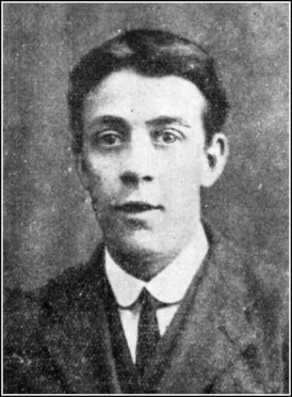
Private Job FAULKNER
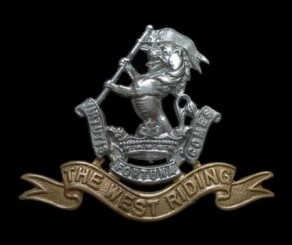
Regiment / Corps / Service Badge: Duke of Wellington’s (West Riding Regiment)

Divisional Sign / Service Insignia: 17th (Northern) Division
Data from Soldiers Died in the Great War 1914 - 1919 Records
Soldiers Died Data for Soldier Records
Surname: FAULKNER
Forename(s): Job
Born: Runcorn, Cheshire
Residence: Silsden, Yorks
Enlisted: Keighley, Yorks
Number: 12147
Rank: Private
Regiment: Duke of Wellington's (West Riding Regiment)
Battalion: 9th Battalion
Decorations:
Died Date: 08/09/15
Died How: Killed in action
Theatre of War: France & Flanders
Notes:
Data from Commonwealth War Graves Commission Records
CWGC Data for Soldier Records
Surname: FAULKNER
Forename(s): J
Country of Service: United Kingdom
Service Number: 12147
Rank: Private
Regiment: Duke of Wellington's (West Riding Regiment)
Unit: 9th Bn.
Age:
Awards:
Died Date: 08/09/1915
Additional Information:
---
View Additional Image(s)
Additional Photo(s) For Soldier Records
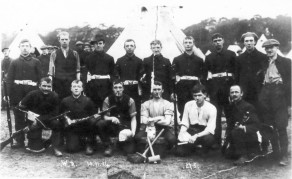
Silsden's first volunteers, at Wimborne, Dorset, 10th November, 1914
(back l-r) - Thomas Stanley Wrigglesworth, Willie Carter, Lawrence Galvin, -----, -----, John Baldwin, Rhodes Spence, A. Turton, -----; front (l-r) - T. Summerscales, Daniel Faulkner, Job Faulkner, -----, Clarkson Baldwin, Ernest Hustwick
Courtesy of Brian Sunderland, Silsden
View Craven Herald Articles
View Craven Herald Articles

17 September 1915
FAULKNER – September 7th, killed by shrapnel whilst serving in France, Pte. Jobey Faulkner, 9th Battalion Duke of Wellington’s Regiment, formerly of Silsden.
17 September 1915
CRAVEN AND THE WAR
Silsden is paying a heavy price. On Monday morning Miss Hannah Faulkner, who resides at Bridge Street, Silsden, received information concerning the death of one of her brothers, Private Jobey Faulkner, of the 9th Battalion, Duke of Wellington's West Riding Regiment. Private Faulkner, who enlisted after the outbreak of war, was one of five brothers serving their King and Country. The Faulkners were the only family in Silsden who could claim to have five representatives in the Army.
Privates Edward and Tom Faulkner have both been wounded in France, the former having gained convalescence and gone beck to the front, but the latter is said to be still nursing his wound in one of the hospitals in this country. Private Jobey Faulkner was killed in France. In a letter to his sister, Private Dan Faulkner says:– “I am sorry to tell you that our Jobey got killed while on duty. He was hit by a piece of shrapnel and died half an hour later. He was hit on the 7th of September about half-past six at night, and was buried the same evening. You must cheer up; it has been very hard for me but we can always say that he did his duty to the last.”
Prior to his death Private Faulkner sent a letter to his sister in which he said:– “I had a letter from George W. Barrett the other day. He said he was going on all right. He said he had had a letter from our "Teddy" when he was coming across to France. We went for a walk as far as the 6th Battalion, and there I saw Sam Bancroft but I did not see Percy Baldwin and Fred Taylor (all Silsden soldiers), as Percy had gone out in the morning with the R.E. and Fred Taylor had just gone on pass. I saw several Steeton and Sutton lads, and they looked very well, but the same as me a bit rough. When you write to Tom or ‘Teddy’ just tell them we should like a word from them.”
Silsden's list of fallen is now eight, four of whom have been recorded during the short space of a week. Four have been killed in France, three in the Dardanelles, and one is this country while on guard duty.
24 September 1915
LETTERS FROM THE FRONT – CHEERY LETTER FROM SILSDEN SOLDIER: The Death of Private Faulkner
In a letter to his parents, who reside at Farden Street, Skipton Road, Silsden, Private Atkinson, of the Duke of Wellington’s West Riding Regiment, writing from the trench in France, says:– “It is now very early after daybreak, and we shall have to be setting to in order to clean the guns and rifles, and also make the breakfast. I will just tell you what we had to breakfast. We had 'fried' steak, bacon and onions, with Oxo in, and bread and jam. We get plenty to eat here. We have made three dugouts in as many days, and also made our own parapet stronger.
“I am sorry to tell you that two of our gunners have been wounded, but not on our gun. We have had our share, but been very lucky again. I don't know whether I am doing right in telling you, but I think I must. One morning a German bullet came through our parapet, turned downwards and caught me on the hip. Luckily it was well spent, and came sideways only making a slight bruise.
“The next day we heard a shell coming straight for our place, it just gave us warning and we prepared, and very quick too. I was just going to have a wash, but I dived into the dugout while the others crouched where they were.
“The shell crashed into the parapet, sending all before it. I was out in a jiffy. I never saw such a sight; part of the parapet was missing, overcoats, rifles and everything were buried with dirt, but fortunately nobody had as much as a pin scratch. I can tell you we made haste and got the gun away to another position. Meanwhile the shells were dropping lower down, one of which killed a Silsden boy, Jobey Faulkner. I was very sorry when I heard about it, I did not see him, but he was laid to rest the next night, his brother, who was in the same battalion, being there. By the time you get this letter the incident to which I have referred will be old news, but I trust it will not make any difference to your happiness.
“Only last night, as we were singing here at ‘stand too,’ one of our fellows remarked how happy we all were. It is a true saying that it takes a lot to make a British Tommy sad. We are having nice weather here though sometimes it gets really too hot for anything. The farmers grow fields full of peas and beans here, and we generally take a walk when in camp and get sat amongst them. I was sorry to hear about ‘Ned’ Lund; I only knew he was wounded.”
24 December 1915
NINTH SILSDEN SOLDIER KILLED
Information has been received of the death of Private Nelson Holmes, of the 6th West Riding Regiment, and son of Mr. Timothy Holmes, of 67, Aire View, Silsden, which took place on the Western Front on December 14th. Second-Lieut. F. Longdon Smith, in a letter received by his father on Monday, states:– “I am very sorry to have to write and tell you that your son Private N. Holmes, of D Company, 6th West Riding Regiment was killed about noon on the day of December 14th. He was on periscope duty at the time, and was fixing his periscope, and must have exposed himself for a second or two and was shot in the head by a sniper. He lived for a few minutes and the stretcher-bearer dressed his wound, but he was never conscious, and from the first we knew there was no hope. On behalf of the Officers, N.C.O.’s and men, I wish to express to you my deepest sympathy in your great loss. Since your son joined us out here he has always shown plenty of pluck and fearlessness, and we are all sorry to lose him.”
Private Holmes, who was only eighteen years of age on the 14th of July last, enlisted on the first day of December of last year. He served a period of training at Skipton, Derby, Doncaster, York, and Thorseby Park, leaving the latter place along with about half-a-dozen Silsden soldiers to go to the Front at the end of June last.
Private Holmes has a brother serving in the same regiment, he going out to the Front along with him. The deceased was a former member of the 1st Silsden Troop of Boy Scouts. This makes the ninth Silsden soldier who has given his life for his country.
The names of the remaining eight are Private Harold Snowden, Private Ben Hodgson, Private Isaac Wade, Private Rhodes Spence, Private W. Gill, Private Ernest Hustwick, Gunner Edward Lund, and Private Jobey Faulkner.
22 December 1916
SILSDEN – A SECOND BROTHER KILLED IN ACTION
Private Daniel Faulkner, son of the late Mr. and Mrs. Richard Faulkner, of Hayhills Lane, Silsden, and brother of Miss Hannah Faulkner, of 71, Oakworth Road, Keighley, and formerly of Bridge Street, Silsden, has been killed in action. Pte. Faulkner, who was 19 years of age, was formerly attached to the West Riding Regiment, but was recently transferred to the Irish Rifles. Miss Faulkner received official information on Wednesday morning from the War Office, and also the following letter which had been written by one of her brother’s friends at the Front:–
“I regret that I have to inform you that we have lost your dear brother of the Irish Rifles. He had only just joined us, and was shot and died about an hour later. I buried his body in the cemetery close by. May God comfort and solace you at this time, and give you the assurance that there is a life beyond where this life is continued in fuller and more happy surroundings.”
Prior to joining the Forces, Pte. Faulkner was employed at Messrs. John Dixon and Sons, bobbin manufacturers, Steeton.
Another brother, Private Jobey Faulkner, of the West Riding Regiment, was killed on September 7th, 1915, as the result of being hit with a piece of shrapnel. Death took place about half-an-hour after he was struck.
There are also two other brothers serving their King and Country – Pte. Thos. Faulkner, of the East Yorkshire Regiment, and Pte. Edward Faulkner, who is attached to a Scottish Regiment. Both the latter have also been wounded in France.
02 March 1917
SILSDEN – THREE SOLDIER BROTHERS KILLED
Three Silsden soldier brothers have made the supreme sacrifice for King and Country – Private Jobey Faulkner, of the West Riding Regiment, who was killed on September 7th, 1915 as a result of being hit in the head by a piece of shrapnel; Pte. Daniel Faulkner, of the Royal Irish Rifles, killed in action in December, 1916; and Private Edward Faulkner of a Scottish Regiment, who has recently died of wounds in a military hospital in Boulogne. They are the sons of the late Mr. and Mrs. Richard Faulkner of Silsden, and information concerning the death of Private Edward Faulkner was received by his sister, Miss Annie Faulkner, who at present resides at 71, Oakworth Road, Keighley, on Thursday of last week. He was 19 years of age and was formerly employed by Messrs. John Dixon and Sons, bobbin manufacturers, Steeton. A fourth brother of the same family, Pte. Thomas Faulkner, is at present serving in France, he being attached to the East Yorkshire Regiment. He has also been wounded. All four brothers joined up shortly after the outbreak of war.
View West Yorkshire Pioneer Articles
View West Yorkshire Pioneer Articles

17 September 1915
FAULKNER – Killed in action, Job Faulkner, of Silsden, aged 22.
17 September 1915
SILSDEN’S GROWING LIST OF DEAD – Three More Deaths Recorded this Week
Silsden has quite a number of her sons in the war, and this week we record the death of three more.
PRIVATE JOB FAULKNER
Miss Hannah Faulkner of 15 Bridge Street, Silsden, received word on Monday morning that one of her brothers, Private Job Faulkner, of the 9th Battalion West Riding Regiment, was killed whilst fighting. Private Faulkner, who was only 22 years of age, enlisted soon after the outbreak of war. Prior to going out to the Front last month, he was stationed at Halifax, Borington and Winchester. The news came in a letter from another brother who is also fighting. Altogether four brothers enlisted for the war. The letter reads:– “I am sorry to tell you that our Job got killed while on duty. He was hit by shrapnel and died half an hour later. We shall be burying him tonight. He was hit on the 7th at about half past 6 o’clock at night. Let me know if you have heard anything from our Teddy or Tommy. You must cheer up for it has been very hard for me. You can say that he died doing his duty to the last.”
By the same post Miss Faulkner received the following letter from one of her brothers:– “Just a few lines to let you know that I received your welcome letter and order. I had a letter from George Willie Barrett the other day, and he said that he was going on all right, and said he had had a letter from our Teddy when he was coming across here. He has not written to us yet, neither has Tommy. I do not know what is the matter, as they have not written. We went for a walk as far as the 6th Battalion and saw Sammy Bancroft, but I did not see Percy Baldwin or Fred Taylor, as Percy had gone out in the morning with the Royal Engineers and Fred Taylor had just gone on pass. I saw several Steeton and Sutton lads, and they looked very well.”
The following letter is from Private Job Faulkner, who is now killed, and it is thought he wrote it just before being hit, and that one of his pals probably found it in his pockets ready for posting:– “We are now out for what they call a rest. We have been out four days, and I think we are still out for another four. I saw Dan the other day and he is all right… “
24 December 1915
CRAVEN’S ROLL OF HONOUR – SILSDEN
Pte. Job Faulkner, 9th West Riding (Duke of Wellington’s) Regiment, killed in action by shrapnel. A member of a well-known family at Silsden.
28 July 1916
SILSDEN’S GALLANT HEROES
Since the war commenced Silsden has lost fourteen of her gallant fighting sons while serving their King and Country. Their names are:–Pte. Ben Hodgson, Pte. Rhodes Spence, Pte. Isaac Wade, Pte. J. Faulkner, Pte. Nelson Holmes, Gunner Edward Lund, Pte. Ernest Hustwick, Pte. Wm. Gill, Pte. Harold Snoddin [Snowden] (killed on the railway while on guard duty in the country), Pte. Thomas Stanley Wrigglesworth, Pte. John Gill, Sergt. John Baldwin, Pte. Robt. Reed, and Pte. Herbert Harper.
22 December 1916
SILSDEN SOLDIER KILLED
Private Daniel Faulkner, son of the late Mr. and Mrs. Richard Faulkner, of Silsden, and brother of Miss Hannah Faulkner, of 71, Oakworth Road, Keighley, and formerly of Bridge Street, Silsden, has been killed in action. Private Faulkner, who was 19 years of age, was formerly attached to the West Riding Regiment, but was recently transferred to the Irish Rifles. Miss Faulkner received official information on Wednesday morning from the War Office, and also the following letter which had been written by one of her brother’s friends at the Front:–“I regret that I have to inform you that we have lost your dear brother, of the Irish Rifles. He had only just joined us, and was shot and died about an hour later. I buried his body in the cemetery. May God comfort and solace you at this time and give you the assurance that there is a life beyond where his life is continued in fuller and more happy surroundings.”
Prior to joining the forces Private Faulkner was employed at Messrs. John Dixon and Sons, bobbin manufacturers, Steeton. Another brother, Private Jobey Faulkner, of the West Riding Regiment, was killed on September 7th, 1915, he on that day being hit with a piece of shrapnel and died half an hour later. There are also two other brothers serving, Private Thomas Faulkner, of the East Yorkshire Regiment, and Private Edward Faulkner, of a Scottish Regiment, and both have been wounded in France.
05 January 1917
INTERCESSION AND MEMORIAL SERVICE AT SILSDEN – Impressive Sermon by Rev. W. Dickinson
An intercession and memorial service for the fallen heroes in the war was held at the Silsden Primitive Methodist Church on Sunday evening last. There was a large congregation, and the officiating minister was Rev. Wm. Dickinson (pastor). During the service the hymns 'O God our help in ages past,’ ‘Lord God of hosts, Whose Almighty hand,’ ‘God the all terrible! King Who ordainest,’ and ‘When wilt Thou save the people’ were sung. Miss Clara Fortune also ably sang the solo ‘O rest in the Lord,’ and at the close of the service the organist (Mr. Bernard Longbottom) played the ‘Dead march’ in ‘Saul,’ and the National Anthem was sung.
WAR A HARMFUL THING
Preaching from the text Psalm 46, 9th verse, ‘He maketh wars to cease unto the ends of the earth,’ Mr. Dickinson said it seemed almost superfluous to say in this sad day in which we lived that war was a serious and harmful thing. It was, however, a great outstanding fact. When they looked at the expense even in times of peace, when nations made preparations for war, it was even then a great expense, but in days of actual warfare as to-day, when the nation was spending at least £5,000,000 a day, then it was that they were reminded that war was a serious thing from a financial point of view. They tried to have dreams or visions as to what would have been done with that money for philanthropic purposes and for the social amelioration of the people of this country, but the country had put those dreams or visions in the back ground. Then we had the cruelty of it, and the passions that it excited. It marched to hunger and thirst and wounds and death. Then we had the bereavements. Children were made orphans, women were made widows, and parents mourned over children and many were left childless. Then we also had the deplorable feelings produced by war, feeling of revenge, feelings that produced quarrelsomeness, a desire for power and an unholy lust of ambition. That was seen by the works of the great Napoleon, and also by the Kaiser and the Prussian War Lords. The question that now forced itself to the front was ‘Is all war morally wrong?’ We had a very high ideal, and we believed that war was all wrong. They read in the Old Book that David was not allowed to build the temple of the Lord because his hands had been stained by blood, and he was spoken of as a man of war. But, in these days we had to look at actual facts. What was the actual state today? When one side would prepare for war and was determined to declare war, what then could we do? That great poet in Russia called Tolstoy preached the doctrine of being passive, but when we came to think of it, could we be passive? If our homes were to be destroyed and our wives and children to be taken from us, could we be passive? Did it not arouse within us that spirit of manhood that we must assert ourselves and that we must fight? If we were not prepared to do that, all he could think was that we were cowards. They ought to bury their heads and be ashamed of themselves. In days of peace with one breath they would denounce all war, and yet in the very next breath they would ask the question why the Congo atrocities were not stopped even if force were necessary. To-day they looked upon a devastated Serbia, Montenegro, Belgium, and alas Roumania, and they came to the conclusion that there were worse things than war – Armenia and the Congo, and the slavery of the South Americans; and what would have been the slavery of Europe had it not been for the call to arms in a cause that was just and righteous?
A JUST AND RIGHTEOUS CAUSE
If it were not for that conviction that the cause for which they were at war was just and righteous, many of them would have failed to preach, to pray, or to look to God. But, it was that which gave them strength that they looked to him Who was the present help and refuge in their trouble. In their fight against war whom should they attack? Often in the past the attack was made upon the soldier. They could not do that to-day as far as this country war concerned. They had a great civilian army, and they were fighting for freedom, for righteousness, and for justice. They never wanted to be soldiers, they never wanted to fight, but the call had come and they could do no other. Who made war, and why should there be war? Not the soldier. In the days that were gone, it was more the civilian than the soldier, the civilian because he was represented by his Parliament and that Parliament as the representative of the civilian often made war, because the lust for power and the lust for gold had got hold of them. Then in the commercial world, amongst what was known as the ruling classes, there was generally speaking a disposition to make war because there was the old saying that trade followed the flag. The soldier fought because he was ordered to do. It was neither Roberts, Kitchener, nor Buller who made the Boer War. If anybody made it, it was Kruger, Milner, and Chamberlain, and it was made because they had greed for power, and an unholy ambition and wish for gold. If they went back through the pages of history, they would find that that was the source of war as far as this country was concerned. He had come to the conclusion that the man who shouted for war had an axe to grind. The man who shouted for war ought to be made to go and face the music and not to send others. What did soldiery stand for? Generally speaking it stood for the aggressive, the quarrelsome, the brute force. They could not say that of the civilian army that had been raised by this country. They were not aggressive, they were not quarrelsome, and neither could they say that they were asserting brute force. He was sorry to have to say it of the Central Powers where conscription had been reigning for so many years. It was the brute force and the aggressive power that they would have to abolish. But when they had said that, they were bound to come to the conclusion that
SOLDIERY HAS ITS GOOD POINTS
The soldier side by side with the doctor stood to give his life for his country and that was a great deal. He would advise anyone to pause before he sneered at a soldier. He stood between them and the enemy, and if it had not been for the brave men who had stood thus, where would they have been to-day? They had no words too high in their commendation and admiration and love for the civilians of this Empire, who had stood between them and the enemy in this time of crisis. The question came to each one of them what was their position and what were they doing in the national crisis that was before them, and still after all they came to the conclusion that the soldier's life as they saw it to-day was a regrettable necessity, that all those brave men should have to shoulder the musket and defend our shores and fight for the freedom, righteousness, and justice of a cause that none of them disputed. They regretted in this the 20th century that such a thing should have happened. It ought not to have come to pass, and it never would have come to pass if the great Central Powers of Europe had taken heed of the sayings of Christ, and had seen His crucified hands instead of the mailed fist, and if they had listened to His beatitudes instead of the philosophy of the German teachers. How were they to lessen those evils? They must attack the root, that lust for power, that quarrelsome spirit, and that unholy ambition that had dominated the great Central Powers. How were they to attack the root? By educating the people for peace at the proper time, and that perhaps was not just yet. It was an easy matter to give descriptions of the horrors of war, to speak of its abominations, and even to denounce statesmen and people who sanctioned war, but how few people there were who searched for methods by means of which war could be put down and destroyed. When the history of the war and the part which the British Empire had taken in it came to be written – he was not a prophet or the son of a prophet – he ventured to say that the writer would pay a fine testimony to the ex-Foreign Minister of this country (Sir Edward Grey) who night and day at the beginning or before the declaration of war strove with all the brain power he had, and with every ounce of strength, he could put in, to avert this great catastrophe. If to-day he was in the back ground, he would looked upon as one of the finest statesmen this country ever had. On what lines were they to educate people for peace? There was a form of Government not only to arrest this demon war, but to bind him in chains. What was it? A cosmopolitan administration or a great Federal Government of the world. They might be dreamers, but certainly there would come a day either in London, Paris, or New York, when there would be a great Federal Government, and that Government would help them to the day when wars would cease.
THE CHURCH'S ROLL OF HONOUR
Proceeding, Mr. Dickinson said he was sure he was voicing the feelings of all present when he said they sympathised very deeply with the families of Pte. Percy Kellett and Lance-Corpl. T.C. Green, both of whom were in hospital suffering from wounds. They prayed for their speedy recovery, and also that their parents and relatives might he comforted. Then they had Ptes. Bernard Locker and Gannett Longbottom, who were reported as missing, and it was hoped that before long good news would be heard of them. They had to add two other names – Pte. Dan Faulkner and Gunner W.H. Sutcliffe, both of whom had been killed in action – to their list of fallen who had been intimately associated with their church and Sunday-school. Mr. Dickinson then read a list of Silsden soldiers who had died serving their King and Country. They were as follows:– Pte. Harold Snoddin [Snowden], Pte. B. Hodgson, Pte. I. Wade, Pte. R. Spence, Pte. E. Hustwick, Gunner E. Lund, Pte. W. Gill, Pte. J. Faulkner, Pte. N. Holmes, Pte. R. Read, Pte. J. Gill, Pte. S. Wrigglesworth, Sergt. J. Baldwin, Sergt. R. Hill, Pte. Wm. Richmond, Pte. W.H. Teale, Corpl. F. Taylor, Pte. H. Harper, Pte. D. Faulkner, and Gunner W.H.Sutcliffe.
Mr. Dickinson also read the church's roll of honour, which comprised 110 names.
02 March 1917
THREE SILSDEN SOLDIER BROTHERS KILLED
Three Silsden soldier brothers have made the supreme sacrifice for King and country, Private Jobey Faulkner, of the West Riding Regiment, who was killed on September 7th, 1915 as a result of being hit in the head by a piece of shrapnel; Pte. Daniel Faulkner, of the Royal Irish Rifles, killed in action in December, 1916; and Private Edward Faulkner, of a Scottish Regiment, who has recently died of wounds in a military hospital in Boulogne. They are the sons of the late Mr. and Mrs. Richard Faulkner, of Silsden, and information concerning the death of Pte. Edward Faulkner was received by his sister, Miss Annie Faulkner, who at present resides at 71, Oakworth Road, Keighley, on Thursday of last week. He was 19 years of age and was formerly employed by Messrs. John Dixon and Sons, bobbin manufacturers, Steeton. A fourth brother of the same family, Pte. Thomas Faulkner, is at present serving in France, he being attached to the East Yorkshire Regiment. He has also been wounded. All four brothers joined up shortly after the outbreak of war.
Comment on this Soldier Record
You can leave comments on this soldier record. Please note all comments will be manually approved before they appear on the website.

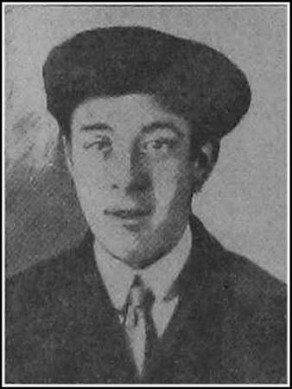
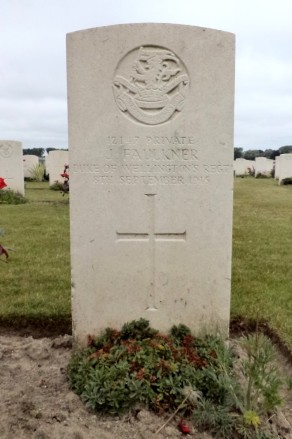



No comments yet.